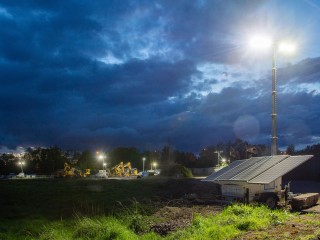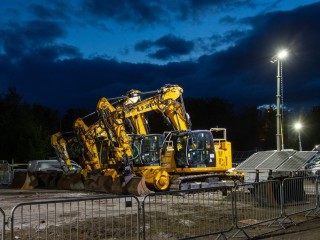A rail renewal project at Llanwern in South Wales – a 14-day project centred on a 72-hour track possession – relied on solar power and batteries for its electricity needs instead of traditional diesel generators. In doing so, they reckon to have saved 6,000 litres of fuel, and more than 15 tonnes of CO2.
The results are being viewed as a significant achievement that marks an environmental milestone towards carbon-free off-grid working, in support of Network Rail’s CP6 target to reduce non-traction energy consumption by almost 20% and carbon emissions by 25%.
Colas Rail production manager Ryan Ballinger said: “A 97% diesel reduction at the first attempt is great achievement. Saving close to 6,000 litres of diesel is the same as driving a family car at 40 mpg twice around the circumference of the world.
“It’s also clear where we have learnt the lessons from Llanwern so we can aim to close that small gap. We really want to get to that 100% fuel-free figure by the time of our next challenge, planned for a rail renewal project later in the summer.
“There’s no doubt these technologies are going to be a complete gamechanger and we need to push on to get to a place where using this type of technology is just business as usual.”
The site used solar lighting and power generation technologies supplied by Prolectric. They were deployed across the site covering more than 21 acres, including on access roads, the welfare cabin area, car parking and the track working area itself, where the London to Cardiff main line meets the Llanwern steelworks spur, near Newport. The set up and core works spanned a period of around 14 days leading up to and following a 72-hour possession, 4-6 May 2019, with more than 70 rail staff employed on site. It has been dubbed the Llanwern Site of the Future project.
Two 25kW Solatainer solar generators replaced conventional diesel generators providing light and heat for seven welfare cabins, including site offices, a canteen, toilets and a drying room. The Solatainer is based on a standard 20ft shipping container with an array of photovoltaic solar panels charging on-board lithium ion batteries.
A total of 21 ProLight solar tower lights illuminated the site compound, car parking and work preparation areas, as well as being deployed on the trackside, where 200-metres of ProTrack battery-powered link lighting was also used. ProTemp column street lights were positioned along the access road to the site.

The Gate Guardian camera security system was also solar-powered, while portable lithium battery packs, recharged as necessary from the solar generators, powered dust suppression systems, water cooler stations and point motors.
“The environmental impact of running diesel generators all day on a major worksite like Llanwern is absolutely huge,” said Ryan Ballinger. “It’s not just about carbon emissions; our lineside neighbours are very important to us. By using solar harvesting, we’re not polluting their environment with unwelcome fumes and noise.”
He added: “We have worked closely to drive the development of suitable on-site solar tower lights and walking lights. Now at Llanwern we have been able to add solar generators for the first time and moving forward we want to add smaller plant and tools such as disk saws and band saws.”
The Llanwern project not only provided feedback to help refine the solar and battery technologies, but also identified energy-efficiency initiatives that can contribute to 100% diesel-free operation.
Prolectric managing director Chris Williams said: “This has been a very successful collaboration with Network Rail and Colas Rail Ltd. The Llanwern initiative has proved that diesel-free operation is possible and was a vital learning experience for us, so we can move to eliminate the use of any diesel for lighting and welfare on future projects.”
Got a story? Email news@theconstructionindex.co.uk




